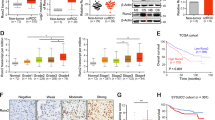Abstract
Renal cell carcinoma (RCC) is the most common type of kidney cancers in adults, and metastasis represents the major cause of mortality of RCC patients. The Y-box binding protein 1 (YB1) is a multifunctional oncoprotein in various malignancies. Enhancer of zeste homolog 2 (EZH2), a polycomb histone methyltransferase, is a key epigenetic modifier implicated in various cancer metastasis. However, the expression patterns and clinical correlations of both YB1 and EZH2 in RCC remain largely unclear. In this study, the expression of YB1 and EZH2 were examined using immunohistochemistry staining in a study cohort including 165 RCC and 80 tumor adjacent normal tissues. RCC tissues showed a significant higher nuclear expression of YB1 (p < 0.001) and EZH2 (p < 0.001) as compared with the normal counterparts. In addition, YB1 and EZH2 nuclear overexpression were found to be positively associated with RCC stage (p < 0.001 and p = 0.005), Fuhrman tumor grade (p = 0.022 and p = 0.044), and metastasis (p < 0.001 and p = 0.009). Overall survival analysis indicated patients with YB1 (p = 0.004, HR 5.656 (2.006–10.944)) and/or EZH2 (p = 0.006, HR 4.551 (2.124–9.438)) nuclear overexpression correlated with poor survival. More interestingly, YB1 and EZH2 nuclear expression was correlated (p = 0.005). Further studies demonstrated that EZH2 expression was significantly downregulated in YB1 knockdown RCC cell lines. Functionally, YB1 knockdown inhibited RCC invasion in vitro. In conclusion, YB1 and EZH2 expression was correlated and associated with RCC incidence, tumor stage, grade, metastasis, and survival.



Similar content being viewed by others
References
Vogelzang NJ, Stadler WM. Kidney cancer. Lancet. 1998;352:1691–6.
Singer EA, Gupta GN, Marchalik D, Srinivasan R. Evolving therapeutic targets in renal cell carcinoma. Curr Opin Oncol. 2013;25(3):273–80.
Wolffe AP, Tafuri S, Ranjan M, Familari M. The Y-box factors: a family of nucleic acid binding proteins conserved from Escherichia coli to man. New Biol. 1992;4(4):290–8.
Lasham A, Print CG, Woolley AG, Dunn SE, Braithwaite AW. YB-1: oncoprotein, prognostic marker and therapeutic target? Biochem J. 2013;449(1):11–23.
Eliseeva IA, Kim ER, Guryanov SG, Ovchinnikov LP, Lyabin DN. Y-box-binding protein 1 (YB-1) and its functions. Biochemistry (Mosc). 2011;76(13):1402–33.
Fushimi F, Taguchi K, Izumi H, Kohno K, Kuwano M, Ono M, et al. Peroxiredoxins, thioredoxin, and Y-box-binding protein-1 are involved in the pathogenesis and progression of dialysis-associated renal cell carcinoma. Virchows Arch. 2013;463(4):553–62.
Shiota M, Takeuchi A, Song Y, Yokomizo A, Kashiwagi E, Uchiumi T, et al. Y-box binding protein-1 promotes castration-resistant prostate cancer growth via androgen receptor expression. Endocr Relat Cancer. 2011;18(4):505–17.
Maciejczyk A, Szelachowska J, Ekiert M, Matkowski R, Hałoń A, Lage H, et al. Elevated nuclear YB1 expression is associated with poor survival of patients with early breast cancer. Anticancer Res. 2012;32(8):3177–84.
Song YH, Shiota M, Yokomizo A, Uchiumi T, Kiyoshima K, Kuroiwa K, et al. Twist1 and Y-box-binding protein-1 are potential prognostic factors in bladder cancer. Urol Oncol. 2013 Feb 6. pii: S1078-1439(12)00396-1.
Stratford AL, Habibi G, Astanehe A, Jiang H, Hu K, Park E, et al. Epidermal growth factor receptor (EGFR) is transcriptionally induced by the Y-box binding protein-1 (YB-1) and can be inhibited with Iressa in basal-like breast cancer, providing a potential target for therapy. Breast Cancer Res. 2007;9(5):R61.
Chattopadhyay R, Das S, Maiti AK, Boldogh I, Xie J, Hazra TK, et al. Regulatory role of human AP-endonuclease (APE1/Ref-1) in YB-1-mediated activation of the multidrug resistance gene MDR1. Mol Cell Biol. 2008;28(23):7066–80.
Jenuwein T, Allis CD. Translating the histone code. Science. 2001;293:1074.
Muller J, Hart CM, Francis NJ, et al. Histone methyltransferase activity of a Drosophila polycomb group repressor complex. Cell. 2002;111:197.
Varambally S, Dhanasekaran SM, Zhou M, et al. The polycomb group protein EZH2 is involved in progression of prostate cancer. Nature. 2002;419(6907):624–9.
Bachmann IM, Halvorsen OJ, Collett K, et al. EZH2 expression is associated with high proliferation rate and aggressive tumor subgroups in cutaneous melanoma and cancers of the endometrium, prostate, and breast. J Clin Oncol. 2006;24(2):268–73.
Cai MY, Tong ZT, Zheng F, et al. EZH2 protein: a promising immunomarker for the detection of hepatocellular carcinomas in liver needle biopsies. Gut. 2011;60(7):967–76.
Hinz S, Kempkensteffen C, Christoph F, et al. Expression of the polycomb group protein EZH2 and its relation to outcome in patients with urothelial carcinoma of the bladder. J Cancer Res Clin Oncol. 2008;134(3):331–6.
Hinz S, Weikert S, Magheli A, et al. Expression profile of the polycomb group protein enhancer of Zeste homologue 2 and its prognostic relevance in renal cell carcinoma. J Urol. 2009;182(6):2920–5.
Wagener N, Holland D, Bulkescher J, et al. The enhancer of zeste homolog 2 gene contributes to cell proliferation and apoptosis resistance in renal cell carcinoma cells. Int J Cancer. 2008;123(7):1545–50.
Wagener N, Macher-Goeppinger S, Pritsch M, et al. Enhancer of zeste homolog 2 (EZH2) expression is an independent prognostic factor in renal cell carcinoma. BMC Cancer. 2010;10:524.
Fujiwara-Okada Y, Matsumoto Y, Fukushi J, Setsu N, Matsuura S, Kamura S, et al. Y-box binding protein-1 regulates cell proliferation and is associated with clinical outcomes of osteosarcoma. Br J Cancer. 2013;108(4):836–47.
Wu K, Chen K, Wang C, Jiao X, Wang L, Zhou J, et al. Cell fate factor DACH1 represses YB-1-mediated oncogenic transcription and translation. Cancer Res. 2014;74(3):829–39.
Acknowledgments
This work was supported by grants (81202380, 81402094, and 81202100) from the National Natural Science Foundation of China, grants (20111202120016) from Ph.D. Programs Foundation of Ministry of Education of China, grants (12JCQNJC07800, 12JCYBJC15600, and 14JCQNJC11600) from Natural Science Foundation of Tianjin, grant (2013M541189) from China Postdoctoral Science Foundation, and grant (201310062002) Tianjin national undergraduate training programs for innovation and entrepreneurship.
Conflicts of interest
None
Author information
Authors and Affiliations
Corresponding author
Electronic supplementary material
Below is the link to the electronic supplementary material.
ESM 1
(DOCX 202 kb)
Rights and permissions
About this article
Cite this article
Wang, Y., Chen, Y., Geng, H. et al. Overexpression of YB1 and EZH2 are associated with cancer metastasis and poor prognosis in renal cell carcinomas. Tumor Biol. 36, 7159–7166 (2015). https://doi.org/10.1007/s13277-015-3417-z
Received:
Accepted:
Published:
Issue Date:
DOI: https://doi.org/10.1007/s13277-015-3417-z




